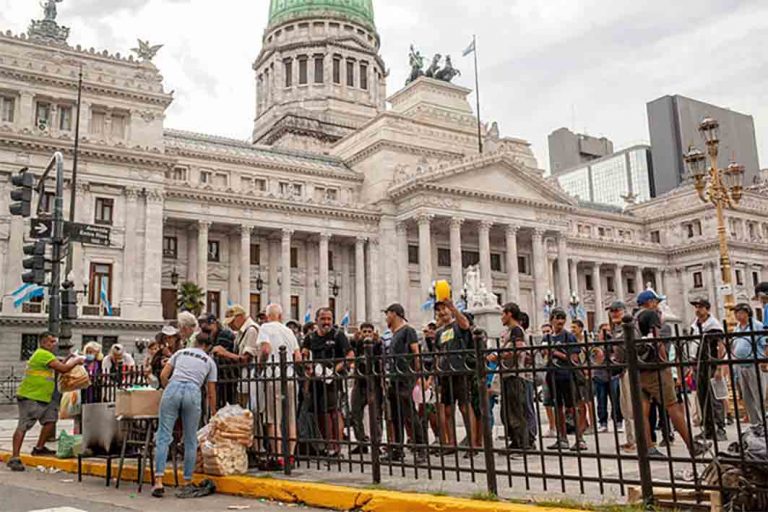
advertentie
Nieuws Archief
Social media

BUENOS AIRES – Javier Milei came to power last December, in an Argentina worn down by successive crises. With the promise of ending the slow decline of the South American country and turning it into a world power again, the president announced that he was going to deregulate all sectors of the economy, privatize public companies, lower taxes, replace the peso with the dollar and shutter the Central Bank. This proposal involves dynamiting the foundations of the bruised Argentine welfare state and replacing it with an economic system that has few regulations and much more market freedom.
In the three months since he became president, Milei has carried out a draconian fiscal adjustment. He has begun to liberalize the economy via executive decree, implementing more than 300 measures. The rental market is now fully in the hands of the landlords: there are no more controls imposed by the government. Private healthcare companies can set the price they wish for their clients, while several industrial and commercial regulations have been repealed. A first step has also been taken towards the privatization of state-owned companies.
Milei’s economic policies have pulled the Argentine people one step backwards from where they were before he assumed office. Inflation now exceeds that of Venezuela and is the highest in the world (276% year-over-year), while the poverty rate is closing in on 60%. Unemployment is also on the rise.
Milei blames the deterioration of the economy on his predecessors and is maintaining a fixed course towards an irreversible transformation. Along the way, he has encountered two obstacles: the National Congress — which has prevented him from gutting the state apparatus — and the justice system, which has put his labor reforms (made via executive decree) on hold.
Runaway inflation has been used by the new government to meet its objectives. Milei’s administration has frozen many social benefits in order to obtain large budgetary savings. This has particularly affected retired Argentines: the minimum pension is now 134,000 pesos (about $130) a month, a figure that is below the poverty line, which is 193,000 pesos for an adult ($185). More and more elderly Argentines cannot afford medications, which have increased in price by more than 300% over the past year.
The middle class is dealing with declining incomes by reducing all possible expenses, as shown by the collapse in consumption. This past February, according to local chambers of commerce, sales in small- and medium-sized businesses fell 25%, while the number of new car license plates fell by 20%, according to the Argentine Dealers Association. Families who still cannot make ends meet have begun to exchange the U.S. dollars they’ve saved up.
The situation is critical for the poorest citizens. Although Argentina is one of the largest food exporters in the world, among its 46 million inhabitants, there are almost five million who suffer from hunger. The income of one in every 10 households is insufficient to purchase essential groceries, which have become 300% more expensive in the last year, with a cost similar to that of Spain, a high-income country.
In 2024, attendance at free community kitchens has reached levels similar to those recorded during the peak of the pandemic in 2020. These meal-providers cannot cope: Milei has suspended the delivery of supplies and has ordered a review of this social assistance model. These kitchens are currently dependent on donations and support from municipal and provincial governments.
To get out of that crisis, Argentina benefited from high international grain prices. That tailwind has ceased, but there’s still good news for Milei: the country has recovered from last year’s historic drought. It’s expected that grain exports will bring in at least $15 billion more this year than in 2023. Milei’s administration will also benefit from the production of fossil fuels from the Vaca Muerta oil field, which is expected to contribute to an energy trade surplus of $3 billion in 2024.
Dollarization as a way out
Milei has promised to adopt the U.S. dollar as the national currency. Economists of different currents consider dollarization to be a terrible idea, but the Argentine president hasn’t taken it off the table. Segments of the citizenry also support the proposal.
In Argentina, the National Congress put a stop to Milei this past February, when he attempted to pass an omnibus bill that would have reformed the state. The official negotiators agreed to trim almost half of the 664 proposed articles, which included the delegation of legislative powers to the president for two years (with the possibility of extension), the reform of the political and tax system, privatizations, restrictions on the right to strike and greater control over protests. The dialogue collapsed because the parliamentarians asked for more resources for the provinces, but Milei refused.
A month later, Milei, once again, is attempting to build a bridge of dialogue with the opposition. He needs Congress to formally pass his economic reforms, as requested by the International Monetary Fund (IMF). Instead of negotiating with the parliamentary blocs, he’s now addressing the provincial governors: he’s offering them more resources in exchange for their region’s legislators approving his rewritten omnibus bill.
The unions called a general strike just 45 days after the new government took power and, in recent weeks, teachers, medical personnel and railway workers have gone on strike. Milei is asking the public for “patience and trust.” Opponents are betting that the people’s patience will run out.
A society divided between the “political class” and the “decent citizens”
Javier Milei experienced his first internal political crisis last week. After championing austerity and targeting the political class during his campaign, a controversy erupted related to salaries in the executive branch. On Monday, March 11, the Argentine president fired Secretary of Labor Omar Yasin. He blamed Yasin for ordering a 48% salary increase across the entire cabinet, after he was called out by opposition Congresswoman Victoria Tolosa Paz, from the left-wing Justicialist Party.
(El país)…[+]